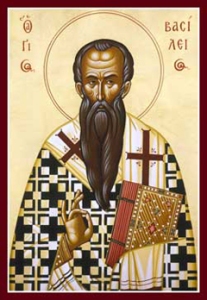We do not…wash ourselves at each defilement, but own the baptism of salvation to be one.
For there the death on behalf of the world is one, and one the resurrection of the dead, whereof baptism is a type.
For this cause the Lord, who is the Dispenser of our life, gave us the covenant of baptism, containing a type of life and death, for the water fulfils the image of death, and the Spirit gives us the earnest of life.
Hence it follows that the answer to our question why the water was associated with the Spirit is clear.
The reason is because in baptism two ends were proposed; on the one hand, the destroying of the body of sin, that it may never bear fruit unto death; on the other hand, our living unto the Spirit, and having our fruit in holiness.
The water receiving the body as in a tomb figures death, while the Spirit pours in the quickening power, renewing our souls from the deadness of sin unto their original life.
This then is what it is to be born again of water and of the Spirit, the being made dead being effected in the water, while our life is wrought in us through the Spirit.
In three immersions, then, and with three invocations, the great mystery of baptism is performed, to the end that the type of death may be fully figured, and that by the handing-over of the divine knowledge the baptized may have their souls enlightened.
It follows that if there is any grace in the water, it is not of the nature of the water, but of the presence of the Spirit. For baptism is not the putting away of the filth of the flesh, but the answer of a good conscience towards God (1 Peter 3:21).
So, in training us for the life that follows on the resurrection, the Lord sets out all the manner of life required by the Gospel, laying down for us the law of gentleness, of endurance of wrong, of freedom from the defilement that comes of the love of pleasure, and from covetousness, to the end that we may of set purpose win beforehand and achieve all that the life to come of its inherent nature possesses.
If therefore any one in attempting a definition were to describe the gospel as a forecast of the life that follows on the resurrection, he would not seem to me to go beyond what is meet and right.
Basil the Great (330-379): On the Holy Spirit 15, 35 [slightly adapted].
 Continued from
Continued from  The dispensation of our God and Saviour concerning man is a recall from the fall and a return from the alienation caused by disobedience to close communion with God.
The dispensation of our God and Saviour concerning man is a recall from the fall and a return from the alienation caused by disobedience to close communion with God.







